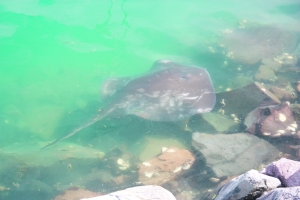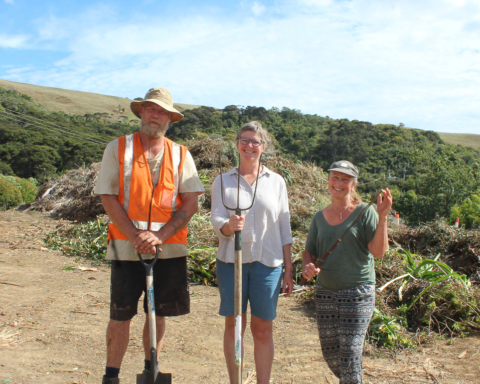Raglan local Con Jackson counts himself lucky to be alive after a stingray incident sent him to hospital for emergency bowel surgery.
What felt like an axe attack turned out to be pain from the venomous barb of a stingray wound suffered while swimming in the shallows at Cox Bay recently.
“I had been out for an afternoon swim and was about to stand up, when I must have swum over the ray in maybe 70cm of muddy water,” he says. “Apparently they whip their tail up with great force if they feel threatened. The pain was intense, so crippling I was lucky there was a man walking on the beach, who came and helped me from the water.”
He was taken to West Coast Medical Centre by the man he thinks was named Brian and his wife, was treated and promptly sent to Waikato Hospital by ambulance where he spent seven days recovering from surgery.
Although the injury looked innocuous at first glance, the barb had punctured the 70-year-old’s small intestine and narrowly missed some vital organs.
“A punctured bowel causes severe infection in the abdominal cavity (peritonitis) and in earlier times would have been fatal,” he says.
University of Waikato stingray researcher Helen Cadwallader says the ray is likely to have been a short or long-tail as they have barbs up to 30cm long and lift their tails over their heads like a scorpion.
“They only ever defend themselves, they are used to defending themselves against orcas and sharks.”
The long-tail has a very long tail which is slender at the end while the short-tail stingray has white spot markings either side of its body. Short-tails reach in excess of 2.3 metres in width and long-tails in excess of 2.1 metres.
Helen says during her years of tagging stingrays for research purposes she and her colleagues have never been ‘stung’ and the incidence of stingray fatalities worldwide is extremely rare.
Not a lot is known about these graceful marine creatures and she says the warmer waters could be bringing more stingray into the shallows or it could just be that the warm weather is bringing more people into the water.
Still in recovery after his surgery, Con says his brush with the stingray will not keep him from swimming and has since been down to Cox Bay to paddle in the water.
However, he says he will take a different approach to swimming in the harbour.
“If you shuffle through the shallow water of mudflats they will usually be aware of you and move off.”
“My biggest mistake was probably to swim alone – never a safe practice really.
If I had been in the water with other people, the stingray would have moved away from the general disturbance. They are beautiful creatures and I recommend treating them with respect.”

Helen agrees with the move she calls the stingray shuffle especially for the murkier mudflat waters and recommends being aware of what’s in the water when you dive in for a swim or jump off your surfboard.
“The short and long-tailed rays will raise their tail when they are threatened. When you are swimming, diving or snorkelling close to a ray, just back away and enjoy them from a distance.”
She also advises hot water, as hot as you can handle it, applied to the wound to denature the protein in the venom and reduce pain.
Janine Jackson











